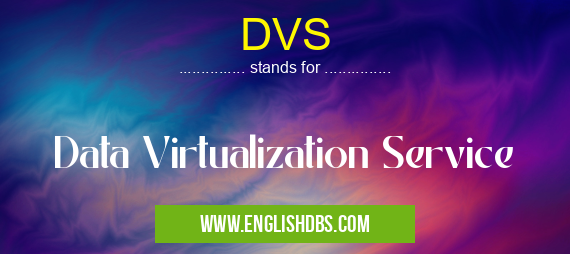What does DVS mean in UNCLASSIFIED
DVS stands for Data Virtualization Service. It is a technology that enables users to access data from multiple sources and locations as if it were a single, unified source. This can be particularly useful for organizations that have data stored in disparate systems or locations, as it allows them to easily access and manage their data without having to physically move or integrate the data.

DVS meaning in Unclassified in Miscellaneous
DVS mostly used in an acronym Unclassified in Category Miscellaneous that means Data Virtualization Service
Shorthand: DVS,
Full Form: Data Virtualization Service
For more information of "Data Virtualization Service", see the section below.
Key Advantages of DVS
- Improved data access: DVS provides a single point of access to data from multiple sources, making it easier for users to find and use the data they need.
- Increased data agility: DVS allows users to quickly and easily change the way they access and use data, without having to make changes to the underlying data sources.
- Reduced data redundancy: DVS can help to reduce data redundancy by providing a single, unified view of data from multiple sources.
- Improved data security: DVS can help to improve data security by providing a single point of control for accessing and managing data.
Key Features of DVS
- Data virtualization layer: The data virtualization layer is the core of a DVS. It provides a logical view of data from multiple sources, making it appear as if it were a single, unified source.
- Data virtualization engine: The data virtualization engine is responsible for managing the data virtualization layer and providing access to data from multiple sources.
- Data virtualization tools: Data virtualization tools are used to create and manage data virtualization projects. These tools can be used to define the data sources, the data virtualization layer, and the data virtualization engine.
Essential Questions and Answers on Data Virtualization Service in "MISCELLANEOUS»UNFILED"
What is Data Virtualization Service (DVS)?
DVS is a cloud-based service that provides a unified view of data from multiple sources, enabling seamless access and integration for various applications and workloads.
What are the key benefits of using DVS?
DVS offers several benefits, including:
- Improved data accessibility and integration
- Reduced data redundancy and inconsistency
- Enhanced data security and governance
- Simplified data management and administration
How does DVS work?
DVS acts as a data abstraction layer that connects to various data sources and creates a virtual data catalog. This catalog provides a unified view of the data, enabling applications and users to access and query data from multiple sources as if it were a single, integrated database.
What types of data sources can DVS connect to?
DVS can connect to a wide range of data sources, including:
- Relational databases (e.g., MySQL, Oracle)
- NoSQL databases (e.g., MongoDB, Cassandra)
- Cloud storage (e.g., Amazon S3, Google Cloud Storage)
- File systems (e.g., HDFS, NFS)
Is DVS suitable for large-scale data environments?
Yes, DVS is designed to handle large-scale data environments. It can scale up to support a high volume of concurrent users and queries, making it suitable for enterprise-level applications and workloads.
How secure is DVS?
DVS employs robust security measures to protect data and ensure compliance. It supports data encryption, access controls, and adheres to industry-standard security protocols.
What are the pricing models for DVS?
DVS offers flexible pricing models that cater to different usage scenarios. Users can choose from pay-as-you-go, subscription-based, or volume-based pricing models to optimize costs.
Is DVS compatible with other cloud platforms?
Yes, DVS is designed to be cloud-agnostic and can integrate with multiple cloud platforms, including Amazon Web Services (AWS), Microsoft Azure, and Google Cloud Platform (GCP).
Final Words: DVS is a powerful technology that can help organizations to improve their data access, agility, redundancy, and security. By providing a single, unified view of data from multiple sources, DVS can help organizations to make better use of their data and to gain a competitive advantage.
DVS also stands for: |
|
| All stands for DVS |
